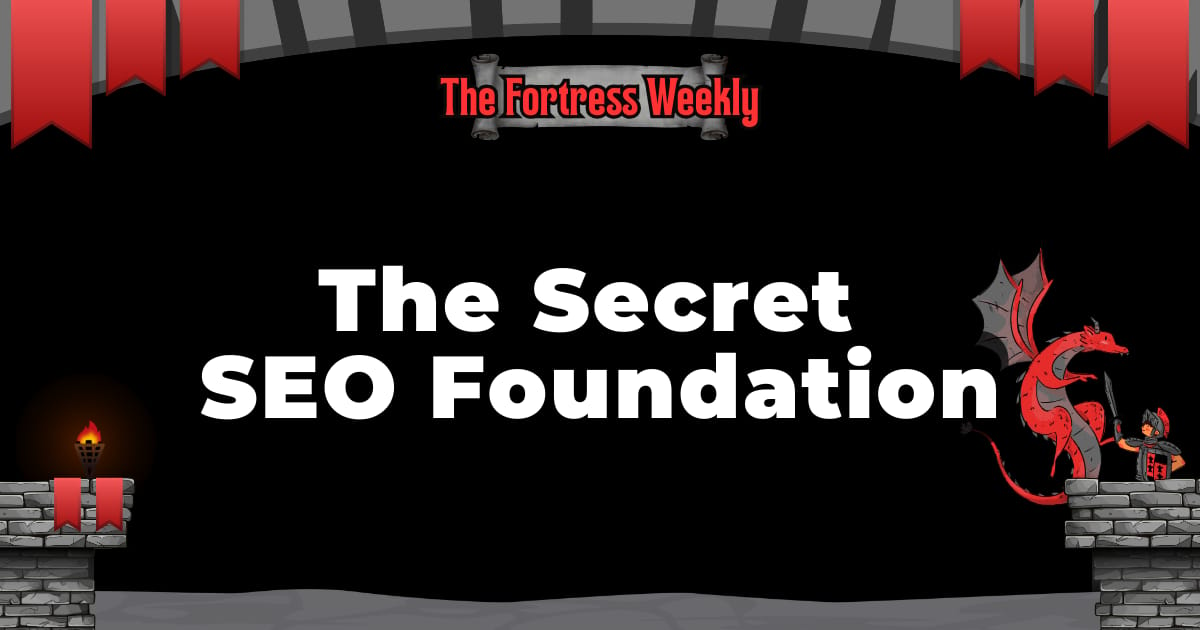🏰 THE FORTRESS WEEKLY
Good morning, SEO warrior.
In today's newsletter, we're going to decode Google's Official SEO Fundamentals. The secret isn't in chasing the latest SEO hacks. It's mastering the proven basics that Google itself tells us to focus on.
You'll learn how to implement Google's own recommended title tag and meta description strategies that are proven to boost engagement and strengthen your foundation for sustainable rankings.
Let's fortify your rankings! 👇

Algorithm Intel
How Google's official SEO fundamentals can boost your click-through rates and ranking stability
The Foundation That Google Actually Wants You to Build
While most SEOs chase algorithm updates and ranking hacks, Google's own SEO Starter Guide reveals the fundamental strategies that form the backbone of sustainable search success, and the data proves these basics still drive the biggest wins.

The Data Behind Google's Fundamentals
Why Google's Official Recommendations Still Dominate Rankings
Google's SEO Starter Guide outlines the core ranking principles that have remained consistent even as algorithms evolve. The guide emphasizes that "SEO is about helping search engines understand your content, and helping users find your site and make a decision about whether they should visit your site through a search engine."
The fundamentals work because they align with Google's core mission: connecting users with the most relevant, helpful content. Research consistently shows that pages following these basics outperform those chasing algorithmic shortcuts.
Key Finding: Google rewrites title tags around 33.4% of the time for pages, with optimal title tags being between 40-60 characters showing 8.9% better CTR (Ahrefs, 2024).

Case Study Breakdown
How Title Tag Optimization Drives Real Results
Backlinko's analysis of 4 million Google search results found that the #1 result has an average click-through rate of 27.6%, which is 10x higher than the #10 result. But here's what's fascinating: URLs containing keyword terms have a 45% higher click-through rate compared to those without keywords (Backlinko, 2025).
When Google chooses to rewrite title tags, it uses the H1 tag about 50.76% of the time, and is 57% more likely to rewrite tags that exceed the character limit (Ahrefs, 2024).
"You can influence the title links in Search by writing good titles: a good title is unique to the page, clear and concise, and accurately describes the contents of the page" - Google's SEO Starter Guide

Your Action Plan
How To Implement Google's Title Tag Strategy
Instead of generic title tags: "Home - Company Name | Business Services"
Apply Google's fundamentals to your title optimization: "Chicago SEO Services | Proven Strategies That Drive Results"
The impact: Research shows that title tags between 40-60 characters have an 8.9% better average click-through rate compared to those outside this range, while titles with positive sentiment can improve CTR by approximately 4% (Backlinko, 2025).
Expected Results: Title tags containing target keywords typically result in a higher click-through rate, with the #1 result averaging 27.6% CTR (Backlinko, 2025).

The 4-Step Google Fundamentals Framework
Your Fortress Foundation Strategy
Step 1: Title Tag Excellence
Follow Google's 40-60 character guideline and place your primary keyword at the beginning. Pages on Google's first page contain 65% to 85% of their ranking keywords in their title tags (Backlinko, 2020).
Step 2: Meta Description Mastery
Create unique 150-160 character descriptions with clear calls-to-action. Google rewrites meta descriptions 62.78% of the time, so focus on compelling, unique descriptions (Ahrefs, 2024).
Step 3: URL Structure Optimization
Use descriptive URLs that include words useful for users, as Google learns breadcrumbs automatically based on URL words (Google SEO Starter Guide).
Step 4: Content Relevance Alignment
Create content that's "easy-to-read and well organized," with content that's "unique, up-to-date, and helpful, reliable, and people-first" (Google SEO Starter Guide).

The Fortress Takeaway
Google's SEO fundamentals aren't outdated. They're the foundation that supports all advanced tactics. While others chase algorithm updates, mastering title tags, meta descriptions, and user-focused content creates the stable base for long-term ranking success.
Focus on Google's proven fundamentals before chasing advanced tactics, these basics drive the highest ROI.
Ready to Build Your SEO Fortress with Data-Driven Strategies?
Stop using outdated SEO tactics that Google ignores. Let's build campaigns that dominate rankings using proven strategies and real data.

